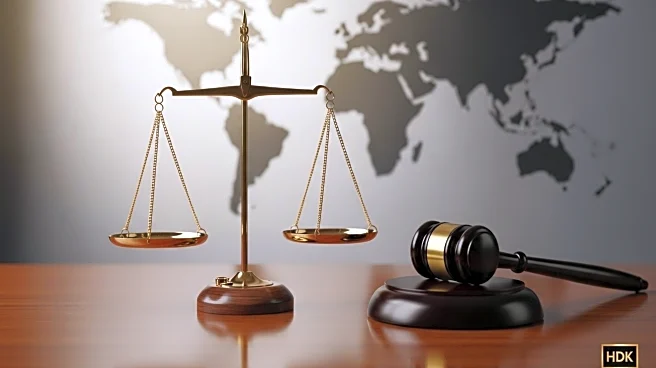What's Happening?
Iran's Foreign Ministry has publicly dismissed the legitimacy of newly reimposed United Nations sanctions, urging countries to disregard these measures. The sanctions were reinstated by the United States, Britain, France, and Germany, citing Iran's violations of the 2015 nuclear accord and its failure to provide credible commitments during recent negotiations. These sanctions are part of a 'snapback' mechanism, allowing participants to restore sanctions without a Security Council vote, which was previously lifted under the Joint Comprehensive Plan of Action (JCPOA) in 2015. Iran maintains that its nuclear program is intended for civilian purposes, despite Western concerns over its nuclear activities and regional threats.
Why It's Important?
The reimposition of sanctions on Iran underscores a significant nuclear deadlock, potentially complicating future efforts by Western powers to monitor Iran's nuclear activities. This development could further strain diplomatic relations and hinder the possibility of reaching a new agreement. The sanctions require Iran to halt uranium enrichment, ban ballistic missile development, and impose travel bans and asset freezes on certain individuals. The situation poses challenges for international diplomacy, as Iran has banned inspectors from the International Atomic Energy Agency from accessing its sites, raising concerns about transparency and compliance.
What's Next?
The future of diplomatic relations between Iran and Western nations remains uncertain, as Iran has rejected the sanctions and accused the European countries of acting in bad faith. The foreign ministers of France, Germany, and the United Kingdom have urged Iran to comply with its legally binding obligations and refrain from escalatory actions. The U.S. State Department has emphasized that Tehran will be held accountable for its actions. It remains to be seen how Iran will respond to these developments and whether diplomatic solutions can be pursued to prevent further escalation.
Beyond the Headlines
The situation highlights broader geopolitical tensions and the challenges of enforcing international agreements. The use of the 'snapback' mechanism reflects the complexities of multilateral diplomacy and the difficulties in maintaining consensus among global powers. The ongoing dispute may have long-term implications for regional stability and the global non-proliferation regime.









